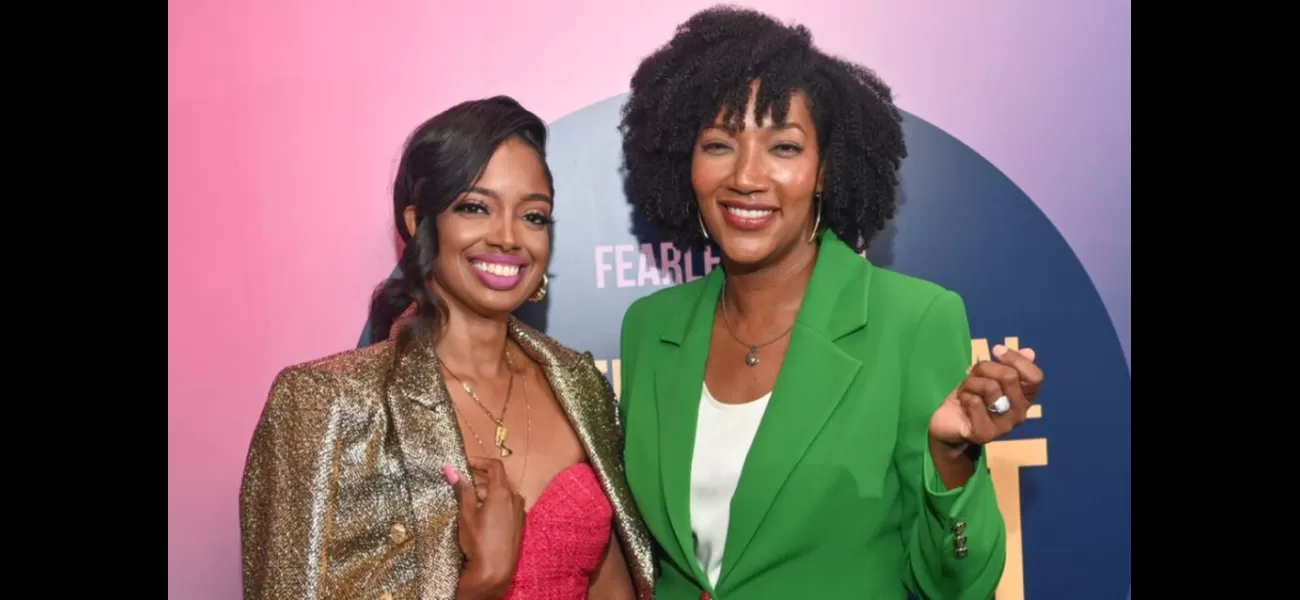Court stops grants from being awarded to brave Black women due to diversity, equity, and inclusion (DEI) concerns.
Court ruling is a setback for Black women.
June 4th 2024.

Recently, the 11th Circuit U.S. Court of Appeals made a temporary decision to halt the Fearless Fund, a grant program for women, from awarding $20,000 grants exclusively to Black women-owned businesses while a lawsuit is ongoing. This news came as a devastating blow to Arian Simone, CEO and founding partner of Fearless Fund, who expressed her disappointment to USA Today. She shared her concern for the impact this decision will have on the dreams of young girls of color, who may now feel like they don't have a fair chance at success. Despite this setback, Simone assured that the Fearless Fund is still "open for business."
Simone also spoke out against the ruling, stating that it sends the message that diversity in Corporate America and education should not exist. She believes that if this decision truly aligned with the American tradition of using our money to support what we believe in, the outcome would have been different. Instead, it seems the judges were influenced by a small group of white men, going against the decisions of other courts who have faced similar cases.
The ruling was in support of conservative activist Edward Blum's claim that the grant program may be discriminatory. This decision overturned a previous ruling made by a federal judge in September, who had deemed the lawsuit unlikely to succeed based on First Amendment grounds. This has dealt a major setback to the Fearless Fund, an Atlanta-based organization that aimed to increase venture capital funding for Black women. It also has the potential to impact other race-based initiatives in the private sector.
This case is part of a larger trend, with conservative activists like Blum now targeting the private sector after their success in last year's landmark ruling against race-conscious college admissions. Blum believes that our nation's civil rights laws do not allow for racial distinctions, even if certain groups are underrepresented in certain fields. He sees programs like the Fearless Fund's as unjust and divisive.
While this decision does not directly affect employers, it has sparked a wave of legal challenges to diversity, equity, and inclusion programs across the nation, causing uncertainty among business leaders. The Fearless Fund, although a relatively small player in the venture capital industry, was founded by Black women to support Black women, who received less than 1% of the $215 billion in venture capital funding last year. Some of their notable investments include the restaurant chain Slutty Vegan and the beauty brand Live Tinted.
Previously, the U.S. District Court Judge Thomas Thrash Jr., a Bill Clinton appointee, had ruled that the Fearless Fund's grant program is protected speech under the First Amendment. However, the 11th Circuit panel, which includes two judges appointed by Donald Trump, disagreed. They stated that "preliminary injunctive relief is appropriate because Fearless's contest is substantially unlikely to enjoy First Amendment protection and inflicts irreparable injury."
Alphonso David, president and CEO of the Global Black Economic Forum and attorney representing the Fearless Fund, referred to this decision as the first court ruling in the 150-plus year history of the post-Civil War civil rights law that has halted private charitable support for any racial or ethnic group. He also mentioned that the dissenting judge, along with the district court and other courts, do not agree with this outcome. David believes this is not the final decision, but rather a preliminary ruling without a full factual record.
In related news, B.E.'s Disruptor Summit will be returning to Atlanta, featuring speakers such as Nick Cannon, Cam'ron, and Arian Simone. This event will provide a platform for discussions on important issues, including this recent setback for the Fearless Fund. It is crucial for us to continue having these conversations and supporting initiatives that aim to promote diversity and equality.
Simone also spoke out against the ruling, stating that it sends the message that diversity in Corporate America and education should not exist. She believes that if this decision truly aligned with the American tradition of using our money to support what we believe in, the outcome would have been different. Instead, it seems the judges were influenced by a small group of white men, going against the decisions of other courts who have faced similar cases.
The ruling was in support of conservative activist Edward Blum's claim that the grant program may be discriminatory. This decision overturned a previous ruling made by a federal judge in September, who had deemed the lawsuit unlikely to succeed based on First Amendment grounds. This has dealt a major setback to the Fearless Fund, an Atlanta-based organization that aimed to increase venture capital funding for Black women. It also has the potential to impact other race-based initiatives in the private sector.
This case is part of a larger trend, with conservative activists like Blum now targeting the private sector after their success in last year's landmark ruling against race-conscious college admissions. Blum believes that our nation's civil rights laws do not allow for racial distinctions, even if certain groups are underrepresented in certain fields. He sees programs like the Fearless Fund's as unjust and divisive.
While this decision does not directly affect employers, it has sparked a wave of legal challenges to diversity, equity, and inclusion programs across the nation, causing uncertainty among business leaders. The Fearless Fund, although a relatively small player in the venture capital industry, was founded by Black women to support Black women, who received less than 1% of the $215 billion in venture capital funding last year. Some of their notable investments include the restaurant chain Slutty Vegan and the beauty brand Live Tinted.
Previously, the U.S. District Court Judge Thomas Thrash Jr., a Bill Clinton appointee, had ruled that the Fearless Fund's grant program is protected speech under the First Amendment. However, the 11th Circuit panel, which includes two judges appointed by Donald Trump, disagreed. They stated that "preliminary injunctive relief is appropriate because Fearless's contest is substantially unlikely to enjoy First Amendment protection and inflicts irreparable injury."
Alphonso David, president and CEO of the Global Black Economic Forum and attorney representing the Fearless Fund, referred to this decision as the first court ruling in the 150-plus year history of the post-Civil War civil rights law that has halted private charitable support for any racial or ethnic group. He also mentioned that the dissenting judge, along with the district court and other courts, do not agree with this outcome. David believes this is not the final decision, but rather a preliminary ruling without a full factual record.
In related news, B.E.'s Disruptor Summit will be returning to Atlanta, featuring speakers such as Nick Cannon, Cam'ron, and Arian Simone. This event will provide a platform for discussions on important issues, including this recent setback for the Fearless Fund. It is crucial for us to continue having these conversations and supporting initiatives that aim to promote diversity and equality.
[This article has been trending online recently and has been generated with AI. Your feed is customized.]
[Generative AI is experimental.]
0
0
Submit Comment





